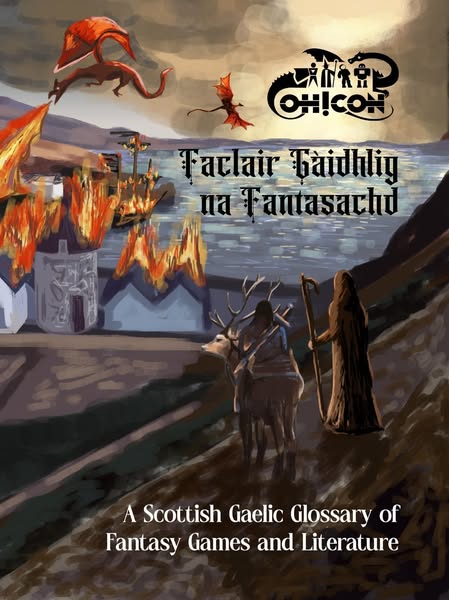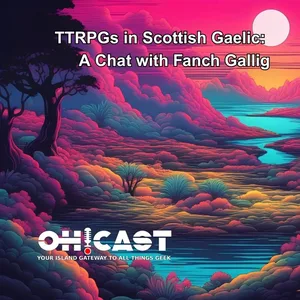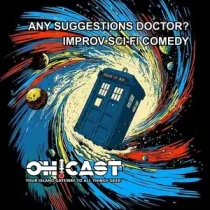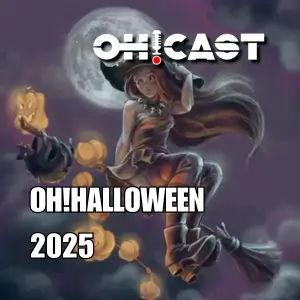
The Breton Roots of Gaelic Fantasy Translation
Host Callum welcomes Fanch back to the podcast. Fanch, a Breton native, discusses his lifelong passion for fantasy and Celtic languages. He explains that his Breton heritage naturally connected him to the folklore of King Arthur and the Knights of the Round Table, which directly influenced his love for modern fantasy like Lord of the Rings and Star Wars. The discussion focuses on his work on Gaelic Fantasy Translation and language reclamation. Fanch, a self-proclaimed language nerd, delves into his personal journey of learning multiple Celtic languages, including Irish, Scottish Gaelic, and even the Doric dialect of Scots. This interest in linguistics leads to a fascinating discussion about J.R.R. Tolkien, a philologist who famously created his epic fantasy world only after first inventing the languages to populate it.
The Cairn RPG and Translation Method
Fanch details the genesis of his Gaelic Fantasy Translation work, which began when he translated the role-playing game (RPG) Cairn for Ocon, the Outer Hebrides Comic Con. He explains that translating the game involved more than simple word-for-word substitution; he had to “think in the language” to make complex terms like “constitution saving throw” make sense to a native Gaelic speaker. This deep dive into translation successfully captures the spirit of the Old School Revival (OSR) philosophy of Cairn. He highlights that the final published version was so successful that many readers assumed it was the original text, a testament to its seamless translation.
Reclaiming Gaelic as a High-Level Language
The discussion moves to Fanch’s new project: a published Glossary of Fantasy Terms for the Gaelic language. He emphasizes that this dictionary wasn’t created out of necessity, as Gaelic already possesses the vocabulary for battles, weapons, and monsters, built through centuries of oral warrior and bardic traditions. Instead, the book reclaims and collects these existing words, offering players everything needed to run a complex RPG campaign entirely in Gaelic. The project is part of a larger theme: language reclamation, restoring Gaelic to its historical position as a language of high culture, law, and power, which counters the common view that it was only ever a language of the croft. Finally, Fanch draws parallels to the recent surge of popularity in Ukrainian language RPGs, showing how tragic events can sometimes galvanize a culture to value their native tongue and integrate it into modern pop culture.
⏱️ Chapters
00:00 – Welcome to OCAST: Gaelic, Comics, and Fantasy
Host Cal introduces the show, the guest Fanch, and their shared love of Gaelic culture and storytelling.
00:54 – Meet Fanch: From Brittany to the Outer Hebrides
Fanch shares his Breton roots and explains how ancient Britons gave their name to the British Isles.
01:50 – Language Passion: From French to Gaelic and Beyond
Exploring Fanch’s journey learning Celtic tongues — Breton, Irish, Scottish Gaelic, and even Doric.
03:39 – Scots, Doric, and Gaelic: Preserving Scotland’s Languages
A lively chat on how Scots and Doric gained official recognition and why these dialects matter.
05:13 – Gaelic in Aberdeen: Lost Dialects and Forgotten Speakers
Discussing Aberdeen’s historical Gaelic roots and the last native speaker’s passing in the 1980s.
06:50 – Growing Up with Fantasy: From Arthurian Legends to Star Wars
Fanch recalls how Breton and Welsh myths inspired his lifelong love of fantasy.
07:57 – Tolkien’s Legacy: The Linguist Who Built Middle-earth
How J.R.R. Tolkien’s background in Old English and Welsh shaped modern fantasy and constructed languages.
09:58 – Inventing Worlds: From Tolkien to Star Wars and Sci-Fi Universes
The evolution of world-building — how fantasy and science fiction broke free from Earth-bound stories.
11:20 – Translating ‘Cairn’: Bringing RPGs into Gaelic
Fanch explains how lockdown and Gaelic-speaking friends inspired him to translate the role-playing game Cairn.
13:19 – The First Gaelic RPG: Publishing ‘Cairn’ for Ocon
Behind the scenes of the Ocon project and gaining permission from creator Yochai Gal.
15:19 – Making Rules Make Sense: Adapting RPG Jargon into Gaelic
The art of translating gaming terms into natural Gaelic that feels authentic to native speakers.
17:27 – Crafting Meaning: Thinking in Gaelic, Not Just Translating
How to translate for cultural meaning, not just literal accuracy — keeping the language alive.
20:55 – Gaelic as the Language of Lords, Bards, and Law
Rediscovering Gaelic’s sophisticated past — from ancient legal texts to high-level scholarship.
22:02 – Storytelling, Roleplay, and Oral Traditions
Why role-playing games fit perfectly into the Gaelic oral storytelling tradition.
23:54 – Language Revival: Parallels with Ukrainian and Other Minority Languages
A look at how languages like Ukrainian and Gaelic use art, games, and comedy for resurgence.
25:33 – The Gaelic Fantasy Glossary: A Lexicon for Magic and Monsters
Fanch reveals his latest book — a dictionary of fantasy terms to help writers and gamers create in Gaelic.
28:20 – Building a Gaelic Fantasy Toolkit
Collecting medieval weapons, creatures, and mystical vocabulary from authentic Gaelic sources.
29:45 – A Resource for Creators: Empowering Gaelic Storytellers
How the glossary enables anyone to write or play fantasy in Gaelic with confidence.
31:10 – Art from the Isles: Dragons Over Tarbert
Celebrating the cover art — Tarbert Harris aflame with dragons, painted by local artist Dòmhnall Smith.
32:45 – Translating the Mechanics: The ‘Saving Throw’ Example
Breaking down how to turn RPG rules like “constitution saving throw” into idiomatic Gaelic.
35:12 – Finding True Gaelic Equivalents: Translating ‘Ranger’
Why some fantasy titles need cultural adaptation — from ‘Ranger’ to ‘Fèinne’ warriors.
39:34 – Invented Creatures and Borrowed Words: Orcs, Balrogs, and More
Dealing with copyright and mythology when inventing Gaelic words for fantasy beasts.
45:08 – Folklore in Translation: The Boogeymen of the Isles
How local tales like the bòcan inspired Gaelic equivalents for goblins and spirits.
46:04 – Real Spells and Gods: Gaelic Myth in the Glossary
Appendices of genuine Highland spells, sea gods, and oral magic traditions.
49:37 – Second Sight and the Supernatural in Gaelic Culture
Personal stories of visions, omens, and belief in the Highlands.
53:11 – Mac an Trònaich: The Hebridean Boogeyman
Exploring the eerie legend of Mac an Trònaich — folklore, fact, and fear on Lewis.
56:50 – From Folklore to Fantasy: Bringing Legends to the Table
How ancient myths like Mac an Trònaich can inspire modern RPG sessions in Gaelic.
57:45 – Where to Find the Gaelic Glossary and RPGs
Details on where to buy or read Fanch’s works — Gaelic Book Council, An Taigh Cèilidh, and online.
59:07 – Gaelic Gaming Around the World
A call to listeners worldwide — from Glasgow to Colombia — to play RPGs in Gaelic.
59:45 – Closing Thoughts: The Future of Gaelic Fantasy
Hopes for more Gaelic role-playing, possible sci-fi projects, and the enduring magic of storytelling.
Hosted on Acast. See acast.com/privacy for more information.
🎙️ OH!CAST: Gaelic Fantasy, Folklore, and the Language of Imagination
Guest: Fanch (Breton linguist & fantasy translator)
Host: Calum (OH!CAST)
Duration: ~1h01m
00:00 – Welcome to OH!CAST: Gaelic, Comics, and Fantasy
Cal: Welcome back to OH!CAST, the official podcast of OH!CON — the Comic Con of the Outer Hebrides. Great to be back after a wee break. Tonight we’ve got a fascinating guest, one who’s been here before — but this time, he’s on the other side of the microphone. Fanch, welcome back!
Fanch: Thanks, Calum. Great to be here.
Cal: You’ve just released a new book, and we’ll dive into that. But first, a bit of background — you’re a Breton from France now living in Stornoway.
00:54 – Meet Fanch: From Brittany to the Outer Hebrides
Cal: So, you’re Breton — technically one of the original Britons?
Fanch: That’s right. The Bretons actually gave our name to the British Isles. My ancestors lived in what’s now Sussex and Wessex before migrating to Brittany about 1,500 years ago.
Cal: So not only do we have you to thank for the culture, but also the name itself — the original Britons!
01:50 – Language Passion: From French to Gaelic and Beyond
Cal: You’re a bit of a language nerd. Has that always been there, or something you picked up later?
Fanch: It came later in life. I grew up speaking French and Breton, but as an adult I wanted to understand other Celtic languages. I started with Irish, then Scottish Gaelic — and of course learned English. It became an obsession to understand what these languages were saying.
03:02 – Celtic Tongues: Breton, Irish, Gaelic, and Manx
Cal: So how many Celtic languages can you speak now?
Fanch: Breton, Irish, and Scottish Gaelic mainly. I’ve done a few lessons in Manx — it’s not widely spoken, but close to Gaelic. As a Breton, I ought to know more Welsh than I do, though!
03:39 – Scots, Doric, and Gaelic: Preserving Scotland’s Voices
Cal: I noticed when we first met at OH!CON meetings, you used some Doric words when speaking English.
Fanch: That’s right — I lived in Aberdeen for a couple of years. I’m fascinated by Scottish cultures and tried to pick up Doric. People there were really welcoming and proud of it.
Cal: Recently, Doric and Scots have been officially recognised as languages — which is brilliant. It’s so important to protect them.
Fanch: Absolutely. They’re part of Scotland’s identity. Many don’t realise some of Scotland’s old legal texts were written in Scots — it was once the country’s official language.
05:13 – Gaelic in Aberdeen and the Roots of Language
Cal: And interestingly, one of the oldest Gaelic dictionaries ever found comes from Aberdeen — the first Gaelic-to-English translation.
Fanch: That’s right. People often forget Gaelic was once spoken far beyond the Highlands. Even in Aberdeenshire — the last native speaker only passed away in the 1980s.
06:50 – Growing Up with Fantasy: Arthur, Asterix, and Star Wars
Cal: You’re also a big fantasy fan — has that always been part of your life?
Fanch: Oh, absolutely. Being Breton, I grew up with Arthurian legends — King Arthur, Merlin, the Knights of the Round Table — all originally from Breton and Welsh folklore. It felt like my own cultural heritage. My brother and I were obsessed with Star Wars and Lord of the Rings. I fell into the fantasy cauldron young — like Asterix — and never came out!
07:57 – Tolkien the Linguist: The Father of Modern Fantasy
Cal: Could you speak Elvish then?
Fanch: (laughs) Only a few words! Tolkien was a philologist — an expert in Old English and Welsh. He built his worlds around his invented languages. He didn’t create stories to hold a language — he created a language and then built a world for it to exist in. That’s how Middle-earth began.
Cal: So Tolkien really set the blueprint for modern fantasy.
Fanch: Yes — he took it beyond myth into fully-formed worlds with their own histories, cultures, and tongues.
09:58 – Creating Worlds: From Tolkien to Star Wars and Sci-Fi Universes
Fanch: Before Tolkien and Star Wars, fantasy stories were often set in our own world — just with magical or supernatural twists. Tolkien and Lucas changed that. They created entire universes detached from Earth. That was revolutionary — a whole new way of thinking.
11:20 – Translating ‘Cairn’: Bringing RPGs into Gaelic
Cal: So that brings us to your translation work — your passions for fantasy and language collide in Cairn, right?
Fanch: Exactly. I’ve been playing tabletop RPGs since I was about 11. During lockdown, I wanted to play online with friends — and many of us spoke Gaelic together. So, naturally, we played in Gaelic. But that meant I needed to translate the game’s rules. That’s how it started — translating RPGs into Gaelic.
13:19 – Publishing the First Gaelic RPG with OH!CON
Fanch: Later, when I moved here and attended OH!CON, I offered to help with Gaelic materials. They came back to me and said, “How about a Gaelic RPG?” I suggested Cairn — it was short enough to translate, but deep enough for real campaigns. And its creator, Yochai Gal, kindly gave full permission. We used his artwork and layout, so I could focus on making the Gaelic text sound natural.
15:19 – Making It Make Sense: Adapting RPG Jargon into Gaelic
Cal: And you did a great job. When I first saw Cairn in Gaelic, I thought it was originally written that way — not a translation.
Fanch: That’s the best compliment I could get! The key was translating meaning, not words. RPGs are full of jargon — you can’t just translate literally. You need to make it sound like it was always meant to exist in Gaelic.
17:27 – Thinking in Gaelic: Translating with Meaning, Not Mechanics
Fanch: When translating into minority languages like Gaelic, there’s a temptation to mimic English exactly. But the goal isn’t to create a mirror — it’s to create something that feels right in Gaelic. Sometimes I’d ask elders for words. They always had natural ways to express things — you just have to think in Gaelic.
20:55 – Gaelic as the Language of Lords, Bards, and Law
Cal: That’s fascinating. People forget Gaelic wasn’t always just a crofter’s tongue — it used to be a language of scholarship.
Fanch: Exactly. Before the Clearances, Gaelic was spoken by the elite — by poets, lords, and lawyers. We have centuries-old legal texts written in Gaelic. So it’s more than capable of handling complex ideas.
22:02 – Oral Traditions Reborn: Storytelling and Roleplay
Cal: It’s like role-playing games bring back that fireside storytelling tradition.
Fanch: Exactly. RPGs are the modern ceilidh. They revive our oral culture — imagination shared around the table.
23:54 – Language Revival Through Play: Parallels with Ukraine
Cal: You know, it reminds me of Ukraine. After the war began, role-playing games and stand-up comedy in Ukrainian suddenly exploded in popularity.
Fanch: That makes sense. When people’s identity is challenged, they rediscover their language. Creativity becomes a form of resistance.
25:33 – The Gaelic Fantasy Glossary: A New Lexicon for Magic and Myth
Cal: So let’s talk about your new book — the Glossary of Fantasy Terms.
Fanch: Yes! After Cairn, OH!CON suggested publishing something else in Gaelic. Kathleen from OH!CON saw my online glossary and asked if it could become a book. I kept adding to it until it reached 124 pages — arms, legs, and tentacles!
28:20 – Building a Gaelic Fantasy Toolkit
Fanch: Gaelic already has words for battles, swords, dragons, and magic — it always did. The Highlands were full of warriors and storytellers. My book gathers those old words, plus phrases for modern fantasy mechanics like “ability checks” and “saving throws.”
29:45 – A Resource for Gaelic Storytellers and Gamers
Fanch: The goal is to give anyone writing or gaming in Gaelic a starting point — so they don’t have to spend hours hunting vocabulary. It’s for writers, GMs, players — anyone imagining in Gaelic.
31:10 – Art from the Isles: Dragons Over Tarbert
Fanch: The artwork’s by Dòmhnall Smith, a local artist from Ness. The cover shows Tarbert, Harris — under attack by dragons. Adventurers look on. It says, “Gaelic can be the language of heroes and monsters again.”
32:45 – Translating Game Mechanics: The ‘Saving Throw’ Example
Cal: Could you give an example — say, translating “Constitution Saving Throw”?
Fanch: Sure! I broke it into meaning. A “throw” is really a test — so deuchainn. “Saving” is about avoiding harm — so sàbhailteachd. “Constitution” relates to strength or endurance — so crìbhachd. Combined, it becomes a natural Gaelic phrase rather than a literal copy.
35:12 – Translating Titles: From Rangers to Fèinne Warriors
Fanch: Sometimes direct translation doesn’t work. Take “Ranger” — in English, that could mean a forest warden, a soldier, or a fantasy wanderer. In Gaelic, I used mèir-còille (warden of the woods) for one sense, or Fèinne — referencing the roaming warrior bands of Gaelic legend. That captures the spirit better.
39:34 – Invented Creatures: Orcs, Balrogs, and Mythic Borrowings
Cal: What about made-up creatures — like Balrogs or Orcs?
Fanch: Balrog’s Tolkien’s invention — I’d probably adapt the sound, maybe Balarog. For real myth creatures like a “roc,” I go back to the original Arabic or Greek term rather than borrowing from English. Gaelic’s always borrowed — from Latin, French, Norse — so that feels authentic.
Cal: And Orc?
Fanch: Tolkien took it from Old English — meaning demon. In Gaelic I’d say orc or urc, something natural to Gaelic phonology.
45:08 – Folklore Roots: Bòcan and the Gaelic Boogeyman
Cal: In my house, misbehaving kids were told the “booballs” would take us.
Fanch: (laughs) Aye — that’s from bòcan, meaning a goblin or boogeyman. Every Gaelic area had its own version.
46:04 – Real Magic: Spells, Gods, and Highland Mythology
Fanch: At the end of the book, I added appendices — lists of old Highland gods and genuine Gaelic spells. For example, Shoni, the sea god of Lewis — people once poured beer into the waves to ensure a good harvest. I even recorded two spells myself from elders in Scalpay and Harris who remembered seeing them performed.
49:37 – Second Sight: Visions and Premonitions in Gaelic Culture
Cal: My grandparents believed deeply in the Second Sight — visions of the future. My uncle once dreamed of a bus outside his home, filled with mourners — months before his brother’s funeral.
Fanch: That’s a manadh — a premonition. Many still believe. These stories keep Gaelic spiritual culture alive.
53:11 – Mac an Trònaich: The Hebridean Boogeyman Legend
Cal: Speaking of monsters — what about Mac an Trònaich? Every family’s got a story.
Fanch: Indeed! There’s even a 19th-century court record from Inverness describing a “spectre” haunting Lewis. The archives burned later, but oral tradition remembers him vividly. Some say he was a vagabond who scared people, maybe even killed someone.
56:50 – From Folklore to Fantasy: Mac an Trònaich Returns
Cal: That could make an amazing Halloween Cairn session.
Fanch: Absolutely — imagine a Gaelic horror one-shot based on the Mac an Trònaich legend!
57:45 – Where to Find the Gaelic Glossary and RPGs
Cal: So if people want your book — where can they find it?
Fanch: It’s available at the Gaelic Books Council in Glasgow, An Taigh Cèilidh in Stornoway, and OH!CON might have a few copies left. You can also find my RPG translations free on my website — link in the description.
59:07 – Gaelic Gaming Around the World
Cal: We’ve got listeners all over — even in Colombia! Maybe they’ll run a Gaelic RPG there someday.
Fanch: That’d be brilliant. There’s already a group in Glasgow that plays in Gaelic — one of their GMs is Swedish! So yes — Colombia next!
59:45 – Closing Thoughts: The Future of Gaelic Fantasy
Cal: Any plans for a sci-fi glossary next?
Fanch: Possibly! I’ve already translated Lasers & Feelings, a space-themed RPG. Sci-fi would need more new words, but Gaelic can handle it. If English can invent warp drive, Gaelic can too.
Cal: Brilliant. Thanks again, Fanch — and thanks to everyone for listening to OH!CAST.
Fanch: My pleasure. Here’s to more role-playing — and more Gaelic worlds.




5 thoughts on “TTRPGs in Scottish Gaelic: A Chat with Fanch Gallig, Translator of ‘Cairn’ – OH!CAST”